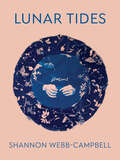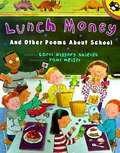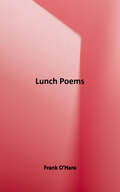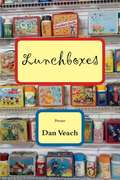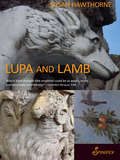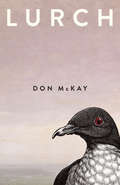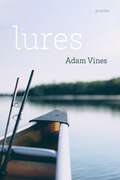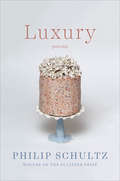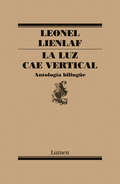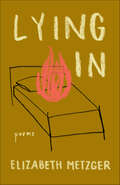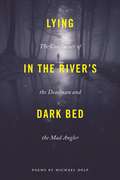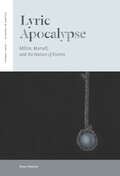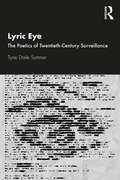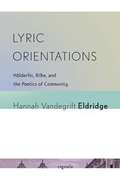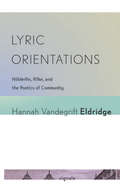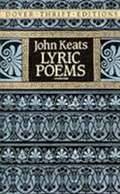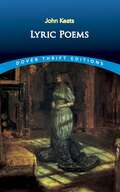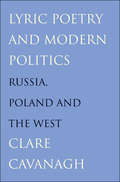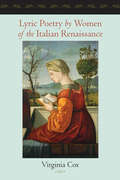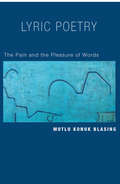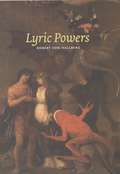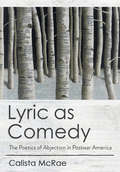- Table View
- List View
Lunar Tides
by Shannon Webb-CampbellExpansive and enveloping, Webb-Campbell's collection asks, "Who am I in relation to the moon?" These poems explore the primordial connections between love, grief, and water, structured within the lunar calendar. The poetics follow rhythms of the body, the tides, the moon, and long, deep familial relationships that are both personal and ancestral. Originating from Webb-Campbell's deep grief of losing her mother, Lunar Tides charts the arc to finding her again in the waves. Written from a mixed Mi'kmaq/settler perspective, this work also explores the legacies of colonialism, kinship and Indigenous resurgence.Lunar Tides is the ocean floor and a moonlit night: full of possibility and fundamental connections.Praise for Lunar Tides"In Lunar Tides, Shannon Webb-Campbell exposes a heart that's broken but also carried across the gulf between the moon and the sea, a heart that knows how "grief takes up with the body." She shows us that grief is tidal, its ebb and flow pulsing like the moon and dog-earring our memories. This book reminds us that, grieving or not, we "need to be held by something other than a theory." —Douglas Walbourne-Gough, author of Crow Gulch"Lunar Tides is both expansive and exacting, inviting us to feel our own relationship to the ocean, belonging and mortality." —Shalan Joudry, author of Walking Ground
Lunch Money: And Other Poems About School
by Carol Diggory ShieldsHere are twenty-four hilarious poems about school, where all kinds of unexpected things happen. <P><P> From an unusual pledge of allegiance and jungle gym gossip to recess rules and the rules of addition, Carol Diggory Shields captures the experiences of schoolgoers with wit and verve.
Lunch Poems: 50th Anniversary Edition
by Frank O'HaraExquisite hardcover gift edition of the groundbreaking poetry collection by the leader of the New York School of poetry, Frank O'Hara. Published on the 50th anniversary of Lunch Poems. Lunch Poems, first published in 1964 by City Lights Books as number nineteen in the Pocket Poets series, is widely considered to be Frank O'Hara's freshest and most accomplished collection of poetry. Edited by the poet in collaboration with Lawrence Ferlinghetti and Donald Allen, who had published O'Hara's poems in his monumental The New American Poetry in 1960, it contains some of the poet's best known works including "The Day Lady Died," "Ave Maria," and "Poem" [Lana Turner has collapsed!]. These are the compelling and formally inventive poems—casually composed, for example, in his office at The Museum of Modern Art, in the street at lunchtime, or on the Staten Island Ferry en route to a poetry reading—that made O'Hara a dynamic leader of the "New York School" of poets. This new limited 50th anniversary edition contains a preface by John Ashbery and an editor's note by City Lights publisher Lawrence Ferlinghetti, along with facsimile reproductions of a selection of previously unpublished correspondence between Ferlinghetti and O'Hara that shed new light on the preparation of Lunch.
Lunchboxes: Poems
by Dan VeachLunchboxes, by Dan Veach, preserves in the amber of poetry a classic 1950s Southern California childhood, complete with Superman capes, coonskin caps, cap pistols, and lunchboxes which, like this book, contain both baloney and Wonder bread. Deep background comes from the backwoods of Tennessee, where Grandpa makes a Nobel Prize discovery, and the kids get a snootfull of Aunt Ruth's snuff. Going farther back still, "A Date with Clio," the muse of history, breezes through a million years of human misadventures. Baloney is sandwiched in the "Scherzo" section--the movement Beethoven reserved for musical jokes. And finally, for those who missed out on Dan's previous book, this lunchbox contains a cool thermos of Elephant Water.
Lupa and Lamb
by Susan HawthorneThis collection of imagist poems combines mythology, archaeology, and translation. Susan Hawthorne draws on the history and prehistory of Rome and its neighbors to explore how the past is remembered. Under the guidance of Curatrix, Director of the Musæum Matricum, and Latin poet, Sulpicia, travelers Diana and Agnese are led through the mythic archives about wolves and sheep before attending an epoch-breaking party to which they are invited by Empress Livia. An enticing tapestry of real and imaginary texts that gladden the readers' hearts, Lupa and Lamb is poet Susan Hawthorne at her best.
Lurch
by Don McKay"[McKay's] exuberantly musical and shrewd poems are ecological in the fullest sense of the word: they seek to elucidate our relationships with our fragile dwelling places both on the earth and in our own skins." --New York Times Book ReviewAn extraordinary collection of poems from Griffin Poetry Prize winner Don McKay. Old joke: &“What&’s the difference between a lurch and a dance step?&” &“I don&’t know.&” &“I didn&’t think so. Let&’s sit down.&” These poems are what happens when you stay out on the dance floor instead, dancing the staggers. The full moon rises from the ocean and you lurch with astonishment that we live on a rocky sphere whirling in space. Or the bird in your hand—a pipit or a storm petrel—conveys the exquisite frailty of existence. And there&’s the complex of lurches as we contemplate our complicity in the sixth mass extinction. Throughout Lurch, language dances its ardent incompetence as a translator of &“the profane wonders of the wilderness,&” whether manifest as Balsam Fir, Catbirds, the extinct Eskimo Curlew, or the ever-present Cosmic Microwave Background. What is the difference between a love song and an elegy? We live between eroding raindrops and accelerating clocks. The piano lifts its lid to show its wire-and-hammer heart.
Lures: Poems
by Adam VinesWritten almost exclusively in traditional, modified, and nonce forms, the poems in Lures renegotiate grief, trauma, southern masculinities, and fatherhood with unflinching resolve. This new collection by Adam Vines draws much of its subject matter and imagery from fishing, revealing how close observations of species, spawning cycles, predation and feeding patterns, underwater topographies, water clarity, and lure choice reflect larger themes of what it means to be lured through memories of those who have passed and those who remain present. With Lures, Vines proposes that by reconstructing the stories from our past, we gain a greater understanding of our cultural identities and inheritances from those who made an impact on our lives.
Luxury: Poems
by Philip Schultz"Philip Schultz’s poems have long since earned their own place in American poetry. His stylistic trademarks are his great emotional directness and his intelligent haranguing—of god, the reader, and himself. He is one of the least affected of American poets, and one of the fiercest." —Tony Hoagland In this compassionate new collection, Philip Schultz’s wry and incisive poetic voice takes on both the eternal questions of meaning and happiness and essentially modern complexities—the collective power of women’s marches, the strangeness of googling oneself, the refugee crisis, the emotions associated with visiting the 9/11 memorial. At once philosophical and droll, Schultz explores life’s luxuries and challenges with masterly precision. Luxury takes its name from the center poem, which has an ironic ring next to Schultz’s Pulitzer Prize–winning collection Failure. The poem is a beautiful exploration of the pull toward life as Schultz examines the question of suicide, intimately probing a familial pull toward that darkness and weaving in the philosophy of Albert Camus and the voices and legacies of Paul Celan and Ernest Hemingway. Using humor, irony, and celebration as ballast against the book’s darker forces, Luxury explores the comfort and sustenance of life, the bittersweet clarity of aging, and the anxiety of existence. From "Greed": Happiness, I used to think, was a necessary illusion. Now I think it’s just precious moments of relief
Luz cae vertical: Antología bilingüe
by Leonel LienlafAntología bilingüe mapuzungun y castellano de una de las voces más delicadas de la poesía mapuche Con cuatro libros en treinta años, Leonel Lienlaf ha construido una obra poética admirable. Desde Se ha despertado el ave de mi corazón, su premiado primer libro, escrito a los 18 años, hasta el enigmático Epu Zuam, Lienlaf ha urdido un arte verbal que, con delicadas imágenes y evocaciones, proyecta algunos rasgos esenciales de la cultura mapuche, como la incidencia clave de los sueños en las decisiones vitales, las luchas históricas o el protagonismo shakesperiano del paisaje y la naturaleza en el destino humano. Esta antología incluye una selección de sus cuatro libros publicados, así como una quincena de poemas inéditos o dispersos.
Lying In: Poems
by Elizabeth MetzgerA devastating, vulnerable collection tracing high-risk pregnancy and new motherhood amid grief.“All my life all I’ve wanted was to be myself / and someone else,” writes Elizabeth Metzger. From the shadowy perspective of confinement, where the presence of death unsettles all outcomes, these poems examine an expansion and fracturing of the self—into motherhood as well as childhood, into past selves and future unknowns. The child becomes parent, the parent becomes child, the child arrives but in doing so is lost. New loss haunts new life, and life becomes “one or two lives.” The door is more valuable than the prize behind it.With ambivalence as well as deep feeling, Metzger wonders how a single body can be expected to hold both immense joy and immense mourning, profound longing and creeping numbness, when one so often overtakes the other. She plunges into the darkness inside—of the gloomy room, the inner body, the afterlife and the pre-language mind—and sends back “a searchlight across the underworld,” Eurydice in search of herself.Aching and contemplative, Lying In is an exquisite portrait of an in-between time—and of the person who emerges on the other side. “Isn’t it obvious how we’ve changed?”
Lying in the River's Dark Bed: The Confluence of the Deadman and the Mad Angler (Made in Michigan Writers Series)
by Michael DelpLying in the River's Dark Bed: The Confluence of the Deadman and the Mad Angler by Michael Delp is a collection of fifty-six poems that brings together two characters Delp has been perfecting for years: Deadman and the Mad Angler. The Deadman, a spirit that constantly shifts, is one part troublemaker, one part truth-teller, and one part demon who demands respect. The Mad Angler, on the other hand, could be called the Mad Shaman or Mad Activist, as he speaks of the water and nature and then of the greed of man. While these two personas are distinct in the collection (highlighted beautifully in the unique double-sided book design) they also come together at times in perfect harmony. The Deadman and the Mad Angler are walking contradictions--twin sons of different mothers. The Deadman is a trickster figure, a hive of contradictions. He can be killed but cannot die. He is supremely intelligent, yet is as dumb as a stone. He is an enigma to himself and to all others, yet he understands the origins and the meanings of the inner lives of all things. He is impossible to understand, yet somehow through his musings enlightenment occurs. His poems inspire contentedness, even though they might frighten you first in order to do so. The Mad Angler is more finely tuned, focused primarily on the environment. He exercises more restraint and resistance than his scattered brother, focusing on nature and on what is flowing in the water around him and inside of him. His voice is sure and firm on all things water related because he is as much river as person. The collection embraces these voices as separate and unique identities, while highlighting a center section called "Confluence," the place where these two come together to meditate on some of the most profound emotions evoked by the contemporary world. Lying in the River's Dark Bed reflects the compatibilities and contradictions of the natural world. These ritualized poems are both funny and thought provoking and an example of persona writing at its best. Those interested in conversational poetry and environmental writing will be enthralled with this stirring yet soothing collection.
Lyric Apocalypse: Milton, Marvell, and the Nature of Events (Verbal Arts: Studies in Poetics)
by Ryan NetzleyWhat’s new about the apocalypse? Revelation does not allow us to look back after the end and enumerate pivotal turning points. It happens in an immediate encounter with the transformatively new.John Milton’s and Andrew Marvell’s lyrics attempt to render the experience of such an apocalyptic change in the present. In this respect they take seriously the Reformation’s insistence that eschatology is a historical phenomenon. Yet these poets are also reacting to the Regicide, and, as a result, their works explore very modern questions about the nature of events, what it means for a significant historical occasion to happen.Lyric Apocalypse argues that Milton’s and Marvell’s lyrics challenge any retrospective understanding of events, including one built on a theory of revolution. Instead, these poems show that there is no “after” to the apocalypse, that if we are going to talk about change, we should do so in the present, when there is still time to do something about it. For both of these poets, lyric becomes a way to imagine an apocalyptic event that would be both hopeful and new.
Lyric Eye: The Poetics of Twentieth-Century Surveillance
by Tyne Daile SumnerLyric Eye: The Poetics of Twentieth-Century Surveillance presents the first detailed study of the relationship between poetry and surveillance. It critically examines the close connection between American lyric poetry and a burgeoning U.S. state surveillance apparatus from 1920 to the 1960s. The book explores the myriad ways that poets—Ezra Pound, William Carlos Williams, W.H. Auden, Langston Hughes, James Baldwin, Sylvia Plath, Gertrude Stein, Robert Lowell, Allen Ginsberg and others—explored a developing and fraught environment in which the growing power of American investigative agencies, such as the FBI under J. Edgar Hoover, imposed new pressures on cultural discourse and personal identity. In analysing twentieth-century American poetry and its various ideas about "the self," Lyric Eye demonstrates the extent to which poetry and surveillance employ similar styles of information gathering such as observation, overhearing, imitation, abstraction, repurposing of language, subversion, fragmentation and symbolism. Ground-breaking and prescient, this book will be of great interest to scholars and researchers of literature, politics, surveillance and intelligence studies, and digital humanities.
Lyric Orientations: Hölderlin, Rilke, and the Poetics of Community
by Hannah Vandegrifte EldridgeIn Lyric Orientations, Hannah Vandegrift Eldridge explores the power of lyric poetry to stir the social and emotional lives of human beings in the face of the ineffable nature of our mortality. She focuses on two German-speaking masters of lyric prose and poetry: Friedrich Holderlin (1770 1843) and Rainer Maria Rilke (1875 1926). While Holderlin and Rilke are stylistically very different, each believes in the power of poetic language to orient us as social beings in contexts that otherwise can be alienating. They likewise share the conviction that such alienation cannot be overcome once and for all in any universal event. Both argue that to deny the uncertainty created by the absence of any such event (or to deny the alienation itself) is likewise to deny the particularly human condition of uncertainty and mortality. By drawing on the work of Stanley Cavell, who explores how language in all its formal aspects actually enables us to engage meaningfully with the world, Eldridge challenges poststructuralist scholarship, which stresses the limitations even the failure of language in the face of reality. Eldridge provides detailed readings of Holderlin and Rilke and positions them in a broader narrative of modernity that helps make sense of their difficult and occasionally contradictory self-characterizations. Her account of the orienting and engaging capabilities of language reconciles the extraordinarily ambitious claims that Holderlin and Rilke make for poetry that it can create political communities, that it can change how humans relate to death, and that it can unite the sensual and intellectual components of human subjectivity and the often difficult, fragmented, or hermetic nature of their individual poems.
Lyric Orientations: Hölderlin, Rilke, and the Poetics of Community
by Hannah Vandegrifte EldridgeIn Lyric Orientations, Hannah Vandegrift Eldridge explores the power of lyric poetry to stir the social and emotional lives of human beings in the face of the ineffable nature of our mortality. She focuses on two German-speaking masters of lyric prose and poetry: Friedrich Hölderlin (1770-1843) and Rainer Maria Rilke (1875-1926). While Hölderlin and Rilke are stylistically very different, each believes in the power of poetic language to orient us as social beings in contexts that otherwise can be alienating. They likewise share the conviction that such alienation cannot be overcome once and for all in any universal event. Both argue that to deny the uncertainty created by the absence of any such event (or to deny the alienation itself) is likewise to deny the particularly human condition of uncertainty and mortality. By drawing on the work of Stanley Cavell, who explores how language in all its formal aspects actually enables us to engage meaningfully with the world, Eldridge challenges poststructuralist scholarship, which stresses the limitations--even the failure--of language in the face of reality. Eldridge provides detailed readings of Hölderlin and Rilke and positions them in a broader narrative of modernity that helps make sense of their difficult and occasionally contradictory self-characterizations. Her account of the orienting and engaging capabilities of language reconciles the extraordinarily ambitious claims that Hölderlin and Rilke make for poetry--that it can create political communities, that it can change how humans relate to death, and that it can unite the sensual and intellectual components of human subjectivity--and the often difficult, fragmented, or hermetic nature of their individual poems.
Lyric Poems
by John KeatsIn his brief existence the English poet John Keats (1795-1821) produced a corpus of poetry that has caused him to be ranked with the very greatest. For many he is the supreme poet of the Romantic era. The present volume contains thirty complete pieces that include the best-known and most highly regarded works of his maturity (except for Endymion, Lamia and Hyperion, too long for such an anthology) and a number of such other juvenile or lighthearted poems as "I stood tip-toe upon a little hill," the epistle to Reynolds, the sonnet to Mrs. Reynolds' cat and "A Song about Myself." The text of the poems is adopted from The Poetical Works of John Keats, edited by H. W. Garrod, Oxford University Press, London, 1956. The order of the poems, also from the Garrod edition, is based on their first publication in collected volumes (see the table of contents for details).
Lyric Poems (Dover Thrift Editions: Poetry Ser.)
by John KeatsOne of the greatest English poets, John Keats (1795-1821) created an astonishing body of work before his early death from tuberculosis at the age of 26. Much of his poetry consists of deeply felt lyrical meditations on a variety of themes--love, death, the transience of joy, the impermanence of youth and beauty, the immortality of art, and other topics--expressed in verse of exquisite delicacy, originality, and sensuous richness. This collection contains 30 of his finest poems, including such favorites as "On first looking into Chapman's Homer," "The Eve of St. Agnes," "On seeing the Elgin Marbles," "La Belle Dame sans Merci," "Isabella; or, the pot of Basil" and the celebrated Odes: "To a Nightingale," "On a Grecian Urn," "On Melancholy," "On Indolence," "To Psyche," and "To Autumn." These and many other poems, reproduced here from a standard edition, represent a treasury of time-honored poetry that ranks among the glories of English verse.
Lyric Poetry and Modern Politics
by Clare CavanaghLyric Poetry and Modern Politics explores the intersection of poetry, national life, and national identity in Poland and Russia, from 1917 to the present. As a corrective to recent trends in criticism, acclaimed translator and critic Clare Cavanagh demonstrates how the practice of the personal lyric in totalitarian states such as Russia and Poland did not represent an escapist tendency; rather it reverberated as a bold political statement and at times a dangerous act. Cavanagh also provides a comparative study of modern poetry from the perspective of the eastern and western sides of the Iron Curtain. Among the poets discussed are Blok, Mayakovsky, Akhmatova, Yeats, Whitman, Frost, Szymborska, Zagajewski, and Milosz; close readings of individual poems are included, some translated for the first time. Cavanagh examines these poets and their work as a challenge to Western postmodernist theories, thus offering new perspectives on twentieth-century lyric poetry.
Lyric Poetry by Women of the Italian Renaissance
by Virginia CoxBilingual, annotated edition of more than 200 poems by Italian Renaissance women, many of which have never before been published in English.Outstanding Academic Title, ChoiceLyric Poetry by Women of the Italian Renaissance is the first modern anthology of verse by Italian women of this period to give a full representation of the richness and diversity of their output. Although familiar authors such as Vittoria Colonna, Gaspara Stampa, and Veronica Gambara are well represented, half of the fifty-four poets featured are unknown even to many specialists. Especially noteworthy is an extensive selection of verse from the period following 1560, which has received little or no critical attention. This later, strikingly experimental, proto-Baroque tradition of verse is reconstructed here for the first time.Virginia Cox creates both a scholarly teaching resource and a collection of poetry accessible to general readers with no previous knowledge of the Italian poetic tradition. Each poem is presented in its original language, accompanied by a translation and commentary. An introduction traces the history of Italian lyric poetry from the fifteenth to the seventeenth century. Cox also provides a guide to meter, rhythm, and rhyme, as well as a glossary of rhetorical terms and a biographical dictionary of authors.Organized thematically, this book offers poems about love, religion, and politics; verse addressed to patrons, friends, family, and places; and polemical and correspondence verse. Four languages are represented: Greek, Latin, literary Tuscan of various levels of standardization, and the stylized rustic dialect of pavan. The volume contains more than 200 poems, of which about a quarter have never before been published in a modern edition and more than a third have not previously been available in English translation."Exhaustive and insightful... This is an amazing book, a major achievement in the field of women's studies."—Renaissance Quarterly, reviewing Women’s Writing in Italy, 1400–1650
Lyric Poetry: The Pain and the Pleasure of Words
by Mutlu BlasingLyric poetry has long been regarded as the intensely private, emotional expression of individuals, powerful precisely because it draws readers into personal worlds. But who, exactly, is the "I" in a lyric poem, and how is it created? In Lyric Poetry, Mutlu Blasing argues that the individual in a lyric is only a virtual entity and that lyric poetry takes its power from the public, emotional power of language itself. In the first major new theory of the lyric to be put forward in decades, Blasing proposes that lyric poetry is a public discourse deeply rooted in the mother tongue. She looks to poetic, linguistic, and psychoanalytic theory to help unravel the intricate historical processes that generate speaking subjects, and concludes that lyric forms convey both personal and communal emotional histories in language. Focusing on the work of such diverse twentieth-century American poets as T. S. Eliot, Ezra Pound, Wallace Stevens, and Anne Sexton, Blasing demonstrates the ways that the lyric "I" speaks, from first to last, as a creation of poetic language.
Lyric Powers
by Robert Von HallbergThe authority of poetry varies from one period to another, from one culture to another. For Robert von Hallberg, the authority of lyric poetry has three sources: religious affirmation, the social institutions of those who speak the idioms from which particular poems are made, and the extraordinary cognition generated by the formal and musical resources of poems. Lyric Powers helps students, poets, and general readers to recognize the pleasures and understand the ambitions of lyric poetry. To explain why a reader might prefer one kind of poem to another, von Hallberg analyzes--beyond the political and intellectual significance of poems--the musicality of both lyric poetry and popular song, including that of Tin Pan Alley and doo-wop. He shows that poets have distinctive intellectual resources--not just rhetorical resources--for examining their subjects, and that the power of poetic language to generalize, not particularize, is what justly deserves a critic's attention. The first book in more than a decade from this respected critic, Lyric Powers will be celebrated as a genuine event by readers of poetry and literary criticism.
Lyric Powers
by Robert von HallbergThe authority of poetry varies from one period to another, from one culture to another. For Robert von Hallberg, the authority of lyric poetry has three sources: religious affirmation, the social institutions of those who speak the idioms from which particular poems are made, and the extraordinary cognition generated by the formal and musical resources of poems. Lyric Powers helps students, poets, and general readers to recognize the pleasures and understand the ambitions of lyric poetry. To explain why a reader might prefer one kind of poem to another, von Hallberg analyzes—beyond the political and intellectual significance of poems—the musicality of both lyric poetry and popular song, including that of Tin Pan Alley and doo-wop. He shows that poets have distinctive intellectual resources—not just rhetorical resources—for examining their subjects, and that the power of poetic language to generalize, not particularize, is what justly deserves a critic’s attention. The first book in more than a decade from this respected critic, Lyric Powers will be celebrated as a genuine event by readers of poetry and literary criticism.
Lyric Shame: The "Lyric" Subject of Contemporary American Poetry
by Gillian WhiteGillian White argues that the poetry wars among critics and practitioners are shaped by "lyric shame"--an unspoken but pervasive embarrassment over what poetry is, should be, and fails to be. "Lyric" is less a specific genre than a way to project subjectivity onto poems--an idealized poem that is nowhere and yet everywhere.
Lyric as Comedy: The Poetics of Abjection in Postwar America
by Calista McRaeA poet walks into a bar... In Lyric as Comedy, Calista McRae explores the unexpected comic opportunities within recent American poems about deeply personal, often embarrassing, experiences. Lyric poems, she finds, can be surprising sites of a shifting, unruly comedy, as seen in the work of John Berryman, Robert Lowell, A. R. Ammons, Terrance Hayes, Morgan Parker, Natalie Shapero, and Monica Youn. Lyric as Comedy draws out the ways in which key American poets have struggled with persistent expectations about what expressive poetry can and should do. McRae reveals how the modern lyric, rather than bestowing order on the poet's thoughts and emotions, can center on impropriety and confusion, formal breakage and linguistic unruliness, and self-observation and self-staging. The close readings in Lyric as Comedy also provide new insight into the theory and aesthetics of comedy, taking in the indirect, glancing comic affordances of poetry. In doing so, McRae captures varieties of humor that do not align with traditional terms, centering abjection and pleasure as facets of contemporary lyric practice.
Lyric in the Renaissance
by Ullrich LangerMoving from a definition of the lyric to the innovations introduced by Petrarch's poetic language, this study goes on to propose a new reading of several French poets (Charles d'Orléans, Ronsard, and Du Bellay), and a re-evaluation of Montaigne's understanding of the most striking poetry and its relation to his own prose. Instead of relying on conventional notions of Renaissance subjectivity, it locates recurring features of this poetic language that express a turn to the singular and that herald lyric poetry's modern emphasis on the utterly particular. By combining close textual analysis with more modern ethical concerns this study establishes clear distinctions between what poets do and what rhetoric and poetics say they do. It shows how the tradition of rhetorical commentary is insufficient in accounting for this startling effectiveness of lyric poetry, manifest in Petrarch's Rime Sparse and the collections of the best poets writing after him.
